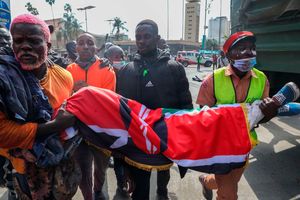
Protesters confront police officers along Kenyatta Avenue in Nairobi during the anti-Finance Bill protests on July 2, 2024.
Kenyans have made a number of gains through court intervention since the Gen-Z protests mid-last year, reinforcing the constitutional rights to demonstrations and freedom of expression.
The court wins have expanded the democratic space, empowering citizens to voice their concerns and engage in shaping the decision-making process.
Although the police have largely ignored the court decisions, the wins have emboldened Kenyans as they push for more democratic space.
Key among the decisions in a ruling on June 28, 2024, when High Court judge Mugure Thande prohibited the police from using excessive force against demonstrators.
The Malindi-based judge prohibited the police from using water cannons, tear gas, and live ammunition during demonstrations.
In Nairobi, High Court judge Jairus Ngaah made another landmark judgment saying the Inspector General of Police Douglas Kanja will be held liable for unlawful use of force by officers, to disperse peaceful and unarmed demonstrations.

Inspector-General of Police Douglas Kanja.
In the landmark decision, the judge said the police boss will be held accountable for any acts or omissions of officers under his command and will be personally held liable for any infringement on the rights of demonstrators.
In the December 31 decision, judge Ngaah ruled that the police boss will be personally liable for any acts or omissions for issuing unconstitutional orders and directives to officers under his command to “use unlawful force to disperse peaceable and unarmed strikes, assemblies, protests, and pickets”.
“A declaration is hereby made that… the Inspector General of National Police Service, is accountable and personally liable for the acts or omissions of officers under his command infringing on the rights of the individual under articles 36, 37 and 41 of the Constitution,” said the judge.
The court added that the police boss will also be held liable for abdicating effective control of police officers under his command by failing to investigate and discipline officers who violate the constitution by using unlawful force to disperse peaceable and unarmed strikes, assemblies, protests, and pickets.
In a petition filed by several human rights groups last year during doctors’ strike, the court also condemned former Inspector General of Police Japhet Koome to personally pay the costs of the case.

People hold a Kenyan flag during a demonstration over the death of Kenyan blogger Albert Ojwang in police custody, in downtown Nairobi, Kenya, June 17, 2025.
Kenya Human Rights Commission (KHRC), Katiba Institute, International Commission of Jurists (ICJ-Kenya), Transparency International (TI-Kenya), and Africa Center for Open Governance (Africog) among others had sued Mr Koome.
The organisations submitted that article 36(1) of the constitution guarantees everyone the right to freedom of association, including the right to form, join or participate in any association.
They further argued that Article 37 of the constitution equally entitles every person peaceably and unarmed, to assemble, demonstrate, picket, and present petitions to public authorities.
Reinforcing the ruling by Justice Thande, High Court judge Bahati Mwamuye stated in yet another decision that the police handling demonstrators should wear name tags or identifiable service numbers.
The judge said where plainclothes or non-uniformed police officers are deployed, they shall not in any way hide or obscure their faces so as to render them difficult to identify or unidentifiable.
The Law Society of Kenya (LSK) moved to court stating that due to the non-identification of the plain-clothed police officers, protestors endure extrajudicial killings, illegal arrests, abductions, detention, intimidation, harassment, torture, cruel, inhuman and degrading treatment and other excesses and violence.
Through lawyer Dudley Ochiel, the LSK said the incognito appearance has enabled the officers to blend in with the peaceful protestors who were exercising their constitutional rights.
Mr Ochiel said some of these police officers were in civilian clothing, covering their faces with masks, balaclavas and other clothing to disguise themselves as goons and militia.
“Any officer deployed to ensure law and order in the course of an assembly, demonstration of picketing must be in uniform, and shall not in any way hide or conceal their face so as to render them identifiable,” declared Justice Bahati Mwamuye.

High Court judge Bahati Mwamuye.
Further, Justice Mwamuye awarded 11 protesters Sh200,000 each as compensation for the violation of their rights by the police during the 2024 anti-government demonstrations against tax hikes.
The declaration emerged from a petition filed by LSK against two police officers, Martin Mbae Kithinji and Isaiah Ndumba Murangiri, who were among the security officers deployed to quell the June 2024 protests.
LSK claimed that Mr Murangiri was behind the death of Rex Masai, who is one of the protestors allegedly shot dead by police on June 18, 2024, in Nairobi CBD during the anti-finance bill protests.

The court declared that police must comply with Section 49 of the National Police Service Act, which obligates every police officer to act lawfully in the performance of their official duties and in exercising police powers.
Justice Mwamuye said any person whose rights are violated by a police officer is entitled to legal redress.
The court further ruled that the police boss does not have powers to arbitrarily outlaw the right to assemble, to picket, to demonstrate and to present petitions to public authorities under Article 37 of the Constitution.
The court ordered the State to pay the protestors -Joy Awich, Muthoni Matu, Kipngetich Eman, Carolyne Mwikali, Stephen Obunde, Raymond Burgei, Felix Gatobu, Chatherine Njoki Njanja, Tim Kut, Wesley Tome and Imran Kasumba- a total of Sh2.2 million.
In the petition, the protestors wanted the financial compensation to be borne by IG Kanja and Senior Assistant Inspector-General of Police (SAIG) Adamson Bungei, individually. Mr Bungei was the Nairobi police commander at the time of the alleged infringements.
The protestors alleged that they were beaten, clobbered, maimed by police while participating in a peaceful march on June 18, 2024 in Nairobi.
They also alleged the State used live bullets on unarmed and peaceful persons, disproportionate force, tear gas and other harmful gaseous substances and spraying water cannons on the protestors.
The court ruled that police acted beyond their powers and underscored that peaceful protest is a protected right in the Constitution.
And in a boost for the Independent Policing Oversight Authority (IPOA), High Court judge Lawrence Mugambi ruled that the agency will have the exclusive mandate of investigating incidences of death and injuries arising from police action or happening in police custody.
The judge said no other investigating body, including the International Affairs Unit (IAU), an independent unit within the National Police Service (NPS), should probe cases of abuses by a police officer on duty or occurring in a police station.
“A declaration is hereby issued that the investigation into all incidents of death and serious injury that are a result of police action caused by a member of police on duty or that which happens while in police custody is an exclusive mandate of the Independent Policing Oversight Authority and not any other investigatory body including the Internal Affairs Unit (IAU) or any other body under the National Police service,” said the judge.
Lobby groups including Kituo Cha Sheria and Haki Africa stated that there have been cases of interference and in some instances, obstruction of investigations when IPOA and IAU conduct parallel investigations.
Extrajudicial killings
The court also directed the NPS and the Director of Public Prosecutions (DPP) Renson Ingonga to provide data on official number of complaints of extrajudicial killings and enforced disappearances received from 2010 to date, and the number of prosecutions particularly officers that have been disciplined and criminally prosecuted.
Veteran lawyer Dr John Khaminwa said in most instances the NPS have taken the role of investigating crimes committed by the police themselves, a fact that has highly compromised the partiality of investigators of the police and which by itself is a conflict of interest.
Justice Mugambi agreed, saying parallel investigations create anxiety. The court said the role of the police in such cases is to secure the scene and allow IPOA to investigate the matter.
The judge said IPOA’s role is to hold the police accountable, promote professionalism and ensure that the officers perform their work professionally.








